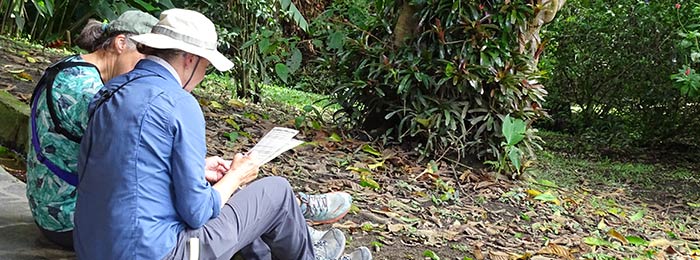Activity Level 2: Easy-Moderate
Participants should be able to walk at least 2 to 3 hours over some uneven and potentially slippery surfaces without difficulty and should be able to ascend or descend 50 stairs consecutively. Physical activities typically last for at least 2 to 3 hours at a time.
Entry & Exit Requirements
U.S. citizens must present a passport valid for at least the duration of their stay to enter Colombia.
A Colombian visa is not required for tourist stays of 90 days or less. Travelers entering Colombia are sometimes asked to present evidence of return or onward travel, usually in the form of a plane ticket.
No arrival tax is collected upon entry into Colombia, but travelers leaving by plane must pay an exit tax in cash at the airport. Most airlines include all or a portion of this fee in the cost of your airline ticket. Check with your airline beforehand to find out how much you will have to pay at the airport.
If you are not traveling with a U.S. passport, please check with the Colombian Embassy for the requirements based on your nationality.
Health & Safety
Please consult your physician for guidance on medical issues. Holbrook Travel is not authorized to provide medical information and the following advice should be confirmed with your doctor.
Immunizations
The Centers for Disease Control recommends that all travelers be up-to-date on routine vaccinations such as measles-mumps-rubella (MMR) vaccine, diphtheria-pertussis-tetanus vaccine, varicella (chicken pox) vaccine, and your yearly flu shot, as well as the COVID-19 vaccine, before every trip.
There are no vaccinations required for entry into Colombia (unless you are arriving from Angola, Brazil, Democratic Republic of the Congo, or Uganda, in which case yellow fever vaccine is required). According to the CDC, yellow fever is a risk in much of Colombia. While not required for entry into the country, the CDC does recommend the yellow fever vaccine for most travelers.
Additionally, the CDC recommends vaccination against hepatitis A, hepatitis B, and typhoid for most unvaccinated travelers to Colombia.
Please visit cdc.gov/travel or consult your physician for additional information and recommendations based on your individual circumstances.
Malaria
The CDC warns that travelers to Colombia may be at risk for exposure to malaria, especially at elevations below 5,600 feet. Malaria is caused by a parasite found in Anopheles mosquitos, which are active from dusk until dawn. Prevention is twofold: the use of anti-malarial drugs and the prevention of insect bites. If you choose to use an anti-malarial drug, as recommended by the CDC, see your physician for a prescription. To protect against mosquitos, cover exposed skin with lightweight, long-sleeved shirts and pants, consider treating clothes with permethrin, and use an insect repellent containing an active ingredient like DEET or picaridin. Apply sunscreen first, followed by the repellent (preferably 20 minutes later).
Other Insect-borne Illnesses
Other insect-borne illnesses are known to occur in Colombia, including dengue fever, leishmaniasis, Zika virus, and others. Travelers to Colombia should protect themselves against insect bites using the measures described above.
As a precaution, the CDC advises women who are pregnant to consider postponing travel to any area where Zika virus transmission is ongoing.
Altitude sickness
Upon arrival at locations of high elevation (above 5,000 feet), shortness of breath and a pounding heart are normal responses to the lack of oxygen in the air. However, for some visitors, these symptoms can deteriorate into altitude sickness. Headache, extreme tiredness, dizziness, nausea, and loss of appetite are standard symptoms. Staying hydrated and well rested is important to adjust to the altitude. Avoiding heavy, fatty foods and alcohol in the days before arriving to altitude can help. Over-the-counter medications are also available to help prevent or alleviate symptoms. It’s advisable to avoid sleep medications, as they can slow breathing and respiration, which aid in getting the blood oxygenated while sleeping. Participants who take blood pressure medications should discuss this with their doctor as the medication can drop pressure too low at times.
SUN EXPOSURE
The effects of the sun can be damaging to the eyes and skin. Spending time outdoors exposes you to the sun’s harmful ultraviolet (UV) rays, even on cloudy days. To protect yourself from the sun, use a broad spectrum sunscreen of at least SPF 15, protect skin with clothing, wear a wide-brimmed hat and sunglasses, and drink plenty of fluids.
Respiratory Illness Protocols
Please review our Respiratory Illness Protocols page, which explains our policy and procedures if you or another traveler should develop symptoms of a respiratory illness during your trip. Your participation in a Holbrook Travel program indicates that you are in agreement with these protocols.


















